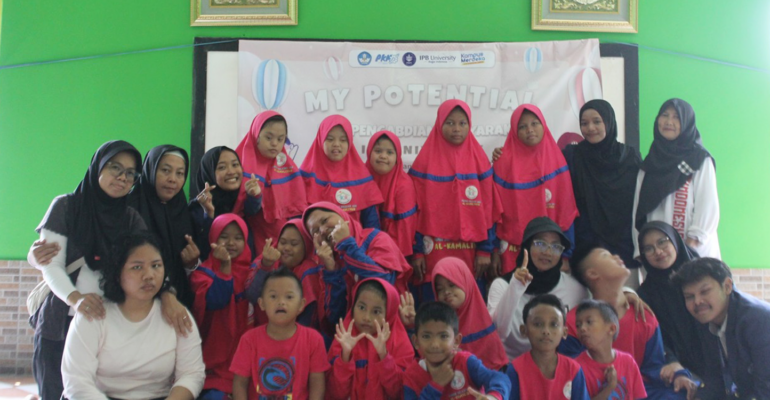My Potential: How IPB University Students Improve the Motoric Skills of Down Syndrome Children

The Student Creativity Program Team in the field of Community Service (PKM PM) IPB University has launched an innovative program called My Potential which is aimed at children with down syndrome in Bogor.
This activity is partnered with the Al-Kamaliyah Bogor Foundation with the target of 15 children with Down syndrome. The main focus of this program is to improve the motor skills of Down syndrome children through the guided discovery learning method.
This My Potential program is chaired by Dhiyaa’ Adzillati Kazabarjad (Aquatic Product Technology) with members of the Nevandia Nur Apriliani (Fisheries Resources Utilization), Novianty Purnama (Family and Consumer Sciences), Fithri Mardhiya Mulia Pamungkas (Landscape Architecture), and Ahmad Eka Alfari (Mathematics) team, under the guidance of Dr Megawati Simanjuntak from the Department of Family and Consumer Sciences.
Dhiyaa said, the background in the making of this program is based on the results of her observations at the Al-Kamaliyah Foundation. The majority of people with Down syndrome there are not yet optimal in their individual mobility according to their age development. Therefore, training related to the application of motor skills is important to do.
“The Al-Kamaliyah foundation has used the Applied Behavior Analysis (ABA) curriculum in the student learning process to understand and know the child’s independence skills. However, currently the foundation is still having difficulty in providing some learning to students, especially training related to the application of their motor skills,” said Anggrek, one of the teachers.
Based on this problem, IPB University students design an alternative with the guided discovery learning method. This program consists of 6 steps, namely stimulation (giving stimulus), problem statement (identifying problems), data collecting (data collection), data processing (processing data that was obtained), verification (verifying), and generalization (conclusion).
The program involves a variety of specially designed activities, including the game My Potential 1: Say Hello to Star (Socialization and pre-test for parents and teachers), My Potential 2: Clay Day (teaching class), My Potential 3: Pattern Day (teaching class), My Potential 4: Painting Day (teaching class), My Potential 5: Maximum Creativity and My Potential 6: Work Release (Exhibition and performing arts). All of these activities aim to stimulate coordination, balance, and target muscle strength.
According to Dhiyaa’, “Down syndrome children have their own potential and creativity. We hope this programme can have a positive impact on down syndrome children at the Al-Kamaliyah Foundation. Through the guided discovery learning method, we want to help them become more skilled and independent.”
“From My Potential, I feel that my child has become more independent. I myself also know better what my child likes. Thank you very much for the students of IPB University,” said one of the target parents.
With promising results, the team hopes the My Potential program will not only benefit children, but also provide new insights for parents on how to support their children’s development. (*/Rz) (IAAS/IAN)



